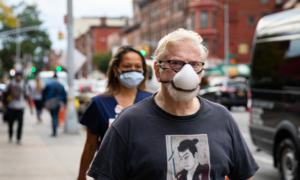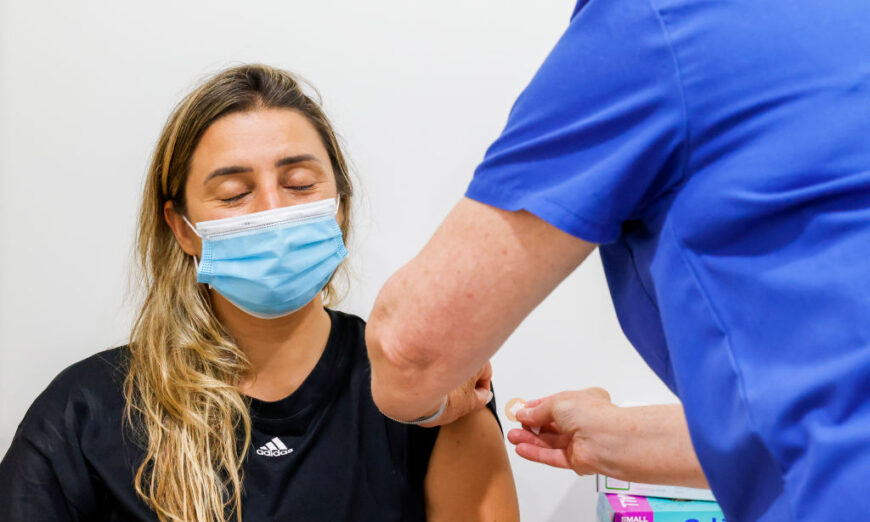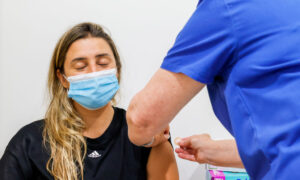Poll: 1 in 4 Americans Know Someone Who Died From COVID Vaccine
Several recent polls suggest that Americans are increasingly wary of COVID-19 vaccines.
A new poll found that about a quarter of Americans believe someone they knew died from COVID-19 vaccines, while another recent survey found that a growing number of Americans are increasingly wary of the shots.
About half of Americans, or 47 percent, said that they know someone who died from the COVID-19 virus, while 49 percent said they don’t know anyone who died from the illness, according to Rasmussen.
It added that “among those who say someone they know died from the COVID-19 virus, 41 percent also say they know someone who died from side effects of the COVID-19 vaccine.”
“By contrast, among those who say they don’t know anyone who died from the virus, only nine percent (9 percent) say they know someone who died from COVID-19 vaccine side effects,” Rasmussen said.
The pollster noted there were no differences in politics in the questions. Some 25 percent of Republican voters said they know someone who died from alleged vaccine side-effects, while 24 percent Democrats and unaffiliated voters said the same. Government employees who were polled were “more than twice as likely as private sectors workers” to tell the pollster that they know someone who personally died from the side effects.
Increasingly Wary
The survey, carried out by the Annenberg Public Policy Center with the University of Pennsylvania, polled 1,500 American adults between Oct. 5 and Oct. 12. It found that about 63 percent of Americans think that getting the COVID-19 vaccine is safer than getting the virus itself—a drop of 12 percentage points from April 2021 when 75 percent held that viewpoint.
It also found that Americans who view the shot as unsafe increased from 18 percent in August 2022 to 24 percent during last month’s poll.
The number of Americans who correlate vaccines to autism has gone up from 10 percent in April 2021 to 16 percent during the October 2023 poll, according to the Annenberg Public Policy Center. Notably, more Americans believe that the the vaccine for measles, mumps, and rubella (MMR) is linked to autism. Nine percent of respondents in June 2021 believed that statement, but 12 percent now say that statement is true, the poll found.
At the same time, the number of Americans who back using ivermectin—a drug that was often demonized by media outlets and even some federal health officials—to treat COVID-19 has risen from 10 percent in September 2021 to 26 percent last month, pollsters found.
Kathleen Hall Jamieson, director of the Annenberg Public Policy Center, said in the poll news release that “growing numbers now distrust health-protecting, life-saving vaccines,” although her group did not appear to try to address why Americans increasingly distrustful of the shots.
After the FDA and CDC both essentially signed off on the latest booster shots made by Moderna, Pfizer, and Novavax in September, recent data has signaled that uptake appears to be relatively slow.
About 15 million people in the United States, including children and adults eligible to get the vaccine, have received the latest shot as of Oct. 27, figures from the Department of Health and Human Services (HHS) show. That amounts to more than 4.5 percent of the American population.
“As of Oct. 27, more than 15 million Americans have received the updated COVID-19 vaccine, and over 19 million vaccines have shipped to pharmacies and other locations, with 91 percent of Americans 12 years and older living within 5 miles of a vaccination site,” an HHS spokesman said in a statement.
By Oct. 26 of last year, approximately 23 million people had received the initial updated booster shot, according to CDC data. The 2022 fall vaccination campaign started around 10 days earlier than the 2023 season. In all, about 56.5 million people, or 17 percent of the U.S. population, got last year’s booster.
This article has been archived for your research. The original version from Epoch Times can be found here.






